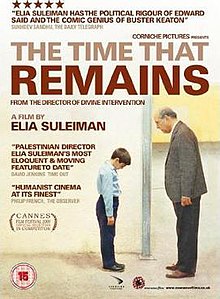
Elia Suleiman is a Israeli-Palestinian film director born in Nazareth, Israel. His film The Time That Remains is the third film in his trilogy on feature films revolving his identity and the Israel-Palestine conflict. The Time That Remains is a semi-biographical dark comedic drama film with minimal dialogue gives the account of the creation of the Israeli state from 1948 to the 21st century and telling the story of Suleiman’s own family in Nazareth, his return to Nazareth as an adult, and his father Fuad Suleiman. The film seems almost surreal, like a dream, as it alternates between time period without explicit transitions. With beautiful techniques and firm grip of the camera for the transitions, the visuals, colors, and the music are prominent throughout the film.
The film begins with an important question, “Where am I?” emphasizing the drastic change of his home from his childhood to his adulthood due to the political situation, the occupation of Palestine by Israel. The beginning focuses on his metal worker father, Faud, in the late 1940’s whose lathe had been used for making guns for the Palestinian fighters. As well, as the beginning stages of Israeli presence, when the mayor hands over his authority to the army and calling for the curfew of Palestinians. Faud is then blindfolded, beaten, and left for dead when Israelis begin to invade houses.
Even after surviving, he is them arrested for smuggling drugs in the sea, where he is seen fishing various times in the night. Throughout the film, there are scenes that seeming to be repeated with little differences only highlighting the limitations of life and what you can do under Israeli occupation. This consists of constant military patrol, being harassed for opposing the Israel state through calling America a colonizer and for offending the Israeli police seen with the woman with the baby walking, resistance fighting, lying to Israeli military, and the psychological effects of the occupation seen by the neighbor who threatens to kill himself by lighting himself on fire. Later as an adult, the Israeli presence is normalized seen in the scenes where the officer brings tabouleh and when the young man is pacing back and forth while on the phone with a military tank aiming at him. This disconnection to an adult Elia reverts back to the question in the beginning of the film as his home now seems foreign to him leaving him only to observe his surroundings hence the minimal dialogue.
Emile Habibi: ‘The Secret Life of Saeed, the Pessoptimist’
Emile Habibi is an Christian Israeli Arab writer of Arabic literature becoming one of the most popular authors in the Middle East. His first novel in 1972 The Secret Life of Saeed the Pessoptimist, later becoming a classic in modern Arabic literature. Similar to Elia Suleiman’s film, it approaches the Israeli-Palestinian conflict with a twist of dark humour. Book One: Saeed, the Ill-Fated Pessoptimist follows the character of of Saaed telling his story regarding Israeli occupation of Palestine and returning to his home after time away in Lebanon, consisting of 20 different letters. Saeed refers to himself as a Pessoptimist, a pessimist and an optimist.
I think Pessoptimism encompasses the spirit of the Palestinian people, pessimistic due to the hard lives they have to endure under Israeli occupation with no legitimate state and optimistic as their strong religious beliefs serve as a source of hope for them to regain their land back. Saaed claims to have been visited by men from outer space causing confusion amongst his retellings of life on what is real and what is not. In both, the book and the film the cultural importance of the father for Palestinians is highlighted as Saeed constantly refers to his martyr father. Saeed gives the background to his family, presenting questionable historical accounts, but discussing how after the 1948 Israeli occupation his family had to disperse to other Arab countries.